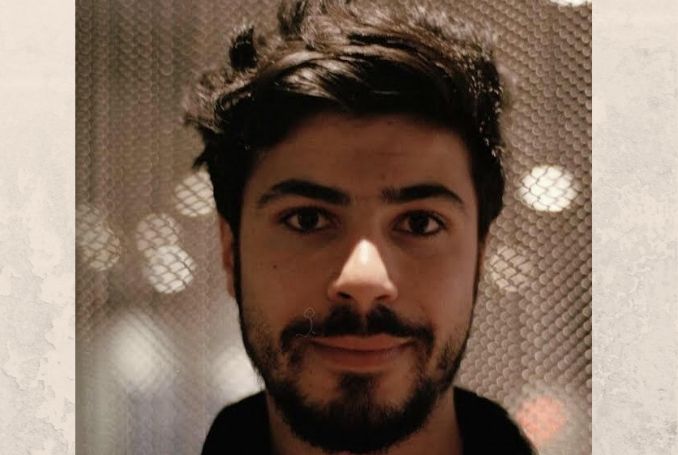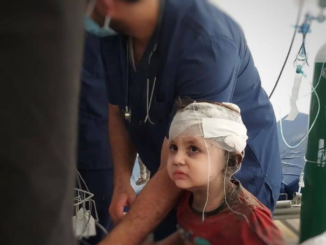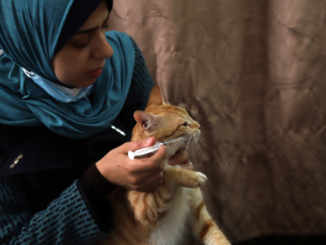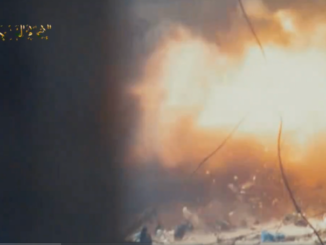
(An Interview with Gazan Filmmaker Ahmed Mansour)
Earlier this week I sat down with Gazan filmmaker Ahmed Mansour before he headed out to the Seattle Premiere of his latest feature-length documentary Brooklyn Inshallah, a film chronicling Palestinian-born cleric Khader El-Yateem’s run for New York City council in 2017.
After the 2014 war in Gaza, Mansour himself moved to the United States.
Over the course of the interview, Mansour described his journey through filmmaking, his views on the difficulty of establishing a viable network of Palestinian artists, and how he views the use of the word “trauma” in the United States, a word he derisively calls an “industry.”
Kevin Gilligan: What attracted you to filmmaking?
Ahmed Mansour: After the war in Gaza in 2014 (Operation Protective Edge), I felt I had to do something. So I picked up a camera instead. I loved it. It was then that I made up my mind that our plight as Palestinians is to tell our story. The Israelis tried everything possible to kill us all. But if you look at the form of injustices and oppression that have been inflicted on us, you see that we Palestinians always managed to find our way. My view is that we have the right to defend ourselves and our freedom using any kind of weapon, any kind of way. When we do this, through film or other means, Palestine gives the whole world an example of a way of using non-violent means against oppression.
We will never vanish. Though our cause will never defeat the Israelis if we only use non-violent or military means. We need something more than that. What I decided after the war and seeing the way they bombed us – the annihilation process by the Israelis – was that it comes down to the story. How are we going to win the story in the international forum? How are we going to let you know in the international community what is happening? How are we going to tell our story?
Because the Israelis and their lobby here (in America) and in Britain control the story. They control the narrative and as the storyteller, they have all the elements to make it work, given the Holocaust, which has nothing to do with the original idea of founding the state of Israel, a colonial project that started many decades earlier in Palestine.
When I came here to America, I went to the Holocaust Museum. I saw Americans, school kids, all crying. They were connecting the Holocaust to Israel and Israel’s aggression against Palestine, even though it’s two separate things completely. The Zionist project started in Palestine many decades before the Holocaust. So I cried as well not because I was sympathizing with Israel but because I saw my grandmother’s journey and my grandparents when they were expelled from their village just south of Jaffa, which is now part of Tel Aviv.
That’s why I was forced to become a storyteller, a documentarian. Also, when I came to the states and saw how Americans viewed us, how Americans get the story upside down, this forced me to become a documentarian as well. The Americans think that we the Palestinians are the oppressor. How did they get that? But that’s how big the propaganda was from the start of Israel in the early days of the 1900s until now, big enough to make whole populations that are supposed to be well educated and have critical thinking skills get the story upside down. So I felt the pressure on me was doubled. Not only was I coming straight from the Gaza Strip after the war, but then I was hit with another reality coming here and seeing American politics and American people, normal people, and talking to them.
My problem is that I like to talk to people a lot. I was a very extroverted guy when I was back home. But here I feel like I’m alien. So I had to learn how to spend a lot of time by myself, to be silent and find a strategy to cope because if you grow up a certain way, with a certain personality, it’s really hard to change. So these are all the elements of what made me a filmmaker. To never be lazy in telling our story, and to always work and team with other filmmakers.
Gilligan: What kind of work did you start off doing?
Mansour: I did shorts, like immature work, in Gaza after the war. There was a nonprofit here in the States that wanted me to make something for them. So I made a film called Gaza Strip Closely. Then I graduated and my university was bombed right afterwards in the war. (laughs) So then it was hard. That’s why the last war was so vicious because schools, nine hospitals, three or four universities, hundreds of mosques, towers with the people inside were bombed. We Palestinians have always known that Israel is a brutal military occupation, that they’re a colonial settler project, so we know that committing massacres is their thing. But the way of the last war – we’d never witnessed that before. Even until now we haven’t gotten over that war.
After I did that film for the non-profit to raise some funds I didn’t know what I was doing. But I had to do something. Here in Gaza, you don’t know what you’re doing, but you have to do something. So we raised enough money and I had the idea – our city is in ruins and there are still bodies in the streets, but let’s celebrate. And I organized and commissioned young people aged between 15 to 22 to contribute with the art pieces. And it turned out to be the biggest art festival in the Gaza Strip. Tell me what the fuck I don’t know about curating! And now I look back on when I was in Gaza, and I don’t know how I was thinking like this. Because now in the States I’m mad about the Israeli apartheid and what they do. I’m outraged. But when I look back to Gaza, right after the war I was calling for peace.
After experiencing a freedom that no one in Palestine knows looks like this, though, when you have some space, some distance, your mind flips to be like outraged and actually it’s this outrage that keeps me moving every day.
Since then I’ve curated some Palestinian film festivals here in America and was a consultant as well. Columbia University was the first institution or film institute in the States to organize a whole film festival on Gaza called Gaza on Screen. All the films take place in Gaza and were made by Gazan filmmakers. Actually, it was a learning experience for me because all my friends that I went to school with, we’re all scattered around the world. We are in an asylum in these countries, and I haven’t been so in touch with Palestinian filmmakers until then.
Gilligan: Is it hard to network with other Palestinian filmmakers?
Mansour: First, we can never see each other for at least a few years until our asylum papers work out. It’s a survival mode for each one of us. It’s really hard that you find a network of artists in Gaza or thinkers or musicians. So Gaza on Screen was a learning journey, and a big moment to date for films made by Gazan filmmakers.
We managed to do it and I was shocked personally because I got to see films that are now, reflecting on them, still shaping my vision. We showed Mohamed Jabaly and his film Ambulance, flying him in from Norway. Another filmmaker came from Gaza and he didn’t speak English, so I volunteered to be his translator. It was for me one of the moments of my last four years here in America that still makes me high. Having films about this place (Gaza) that’s almost forgotten…
I started doing films in Gaza, but I felt that my work was worthless simply because no one was believing in it, so to have the opportunity of reaching out to these filmmakers that are really good but have never had a platform – to call someone from the States and say “Your work is being featured in New York”… it’s the world for them. And for me.
When you reached out to me about doing the Palestinian Review, I was dying from inside that this could, and should happen everywhere. I’m so happy that you were thinking about that having something like this. Maybe you’re going to create the network that we spent months and months and months trying to make by collecting films.
Because even here, some of the filmmakers that I meet in New York, they send me work on Palestine that I’ve never seen before. I met someone and they started introducing me slowly to others and others and others, people who asked me to check their facts or translate for them, to be a contact for them. But I mean, they struggle to find me. But if there was a platform like what you’re talking about, which should have happened years and years and years ago, this could be so different.
Things like Forensic Architecture, for instance, I got to know them from my American friend. You see how bad it is. I get to know a lot of Palestinian filmmakers through Americans. But this is also because, as much as I’m passionate, I understand that each one of us Palestinian filmmakers carries deep scars inside. So when we get out, we really enjoy solitude. We stop kinda networking with other Palestinians, simply because every Palestinian story is different. Every Palestinian story is about suffering, but suffering from different things. So it’s hard for us to have the time, or have this state of mind to try to create networks. So actually the role of outsiders and outside activists, outside believers, has been good in trying to connect all the dots.
Gilligan: So trauma plays a role in the difficulty of building a network?
Mansour: I am against how the word trauma is used in the US. It’s just an industry for yourself. This is the truth: a normal reaction to a normal situation is normal. But then again a normal reaction to an abnormal situation is normal as well. For 70 years Israelis have used every inhumane and every possible way to kill, torture, imprison and expel Palestinians. So whatever we use or do back home in response to this abnormal situation has become normal. Our collective mind in Palestine, it says, “This is our land. We’re gonna keep fighting.” This is normal for us. But then you come to the states and you meet the white middle and upper-middle-class Americans, the do-gooders, and they want to see you as a victim. They convince themselves that you are not normal when they do this.
I find “trauma” to be an industry, used instead of simply facing the perpetrator, the Israelis, whom the taxpayers give 1.3 billion dollars a year to every year, and saying that they [the Israelis] have the actual trauma. Every morning when an Israeli soldier leaves for their work, which is to go to the checkpoint and to humiliate Palestinians and shoot and kill, it is they who have the trauma. It’s not a fun job. When they come back from work and their wife says “How was your day?” what are they supposed to say? “Yeah, I killed two people. I imprisoned two children”?
Instead, in the US people come to the oppressed people, to an oppressed person like me, and they want to try to heal me, and suppress my view and my outrage as a trauma. This is where they get it wrong. Really the Israeli society is the most traumatized society in the world because their whole story, the way they created the story of Israel, it was founded on trauma and on guilt. And then in order to keep this country, they have to always be feared, and they have to always be afraid of an enemy. So the Arab spirit of Palestinians, they have to kill it.
But what happens if you go to Gaza for example, after so many decades of wars and no water, nothing, and you go to a wedding, you find that our weddings are fun. People are chilling. This is it. Because this is our culture. We’re simple people.
This is how I see it: we are resilient and they are traumatized. But here in the States, they get it wrong. Instead of really facing the true shit they say, “Let’s go and see the mental health of Gazans.” This is something that in a few years I will do a project on. How this “trauma” stuff is an industry. Instead of saying “Yes, Israel has to end this military occupation, open the borders for the Palestinians and we [the US] have to cut the funding because Israel is an occupier and a settler state,” they’re too afraid to do that. Instead, here’s the trauma industry for the Palestinians. For me the project that I am going to about the Gazan wars, its not for me personally. My audience knows Americans. I’m going to show them first of all what really happened here and then show them the Israelis. We’re normal people. We didn’t choose what happened to us. Trauma, it’s an industry. Palestinians are resilient.
(Ahmed Mansour’s official website: https://www.gazatonyc.com)
– Kevin Gilligan is an experimental filmmaker, sound designer and recent graduate of Bennington College. His work centers around grief and the fragility of human memory. His work can be viewed here: https://vimeo.com/kevinprince. He contributed this interview to The Palestine Chronicle.







